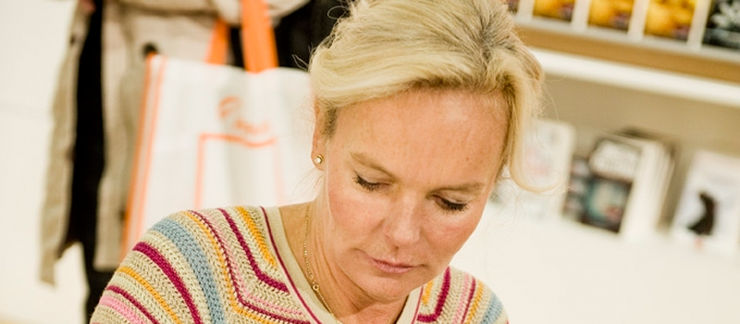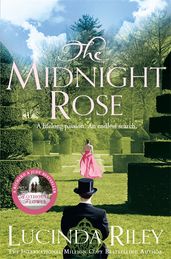Lucinda Riley on how her life imitates her art
Read about the extraordinary connnection between bestselling author Lucinda Riley's family history and the characters in her novel The Midnight Rose, which is set in the heyday of the British Raj in India.

Bestselling author Lucinda Riley shares the story of how she discovered that her novel The Midnight Rose actually reflected her own family history.
From when I was a child, I knew I had a ‘sixth sense' and would often ‘know' things that then happened shortly afterwards. I have a large family and all of them decry my strange side, even if the thing I tell them about does happen shortly afterwards. ‘Coincidence' they all cry, with irritating regularity. However, something happened recently that made them begin to believe there is something behind Mummy's ‘madness'.
To backtrack … it's always a particular location that provides me with inspiration for my next book. And I decided two years ago that I wanted to set my new story in India. When I begin to write, I often get the uncanny feeling that the stories in my books are ‘told' to me. This may sound far-fetched, but it's as if people and places from the past are whispering their stories in my ear, and I simply let them lead me.
Just after I'd finished the book in December 2012, my mother turned up at our house. Ironically, as it was just before Christmas, the entire family was in residence. I was led into the sitting room to find all of them staring at me as I entered. Worried there was bad news, my husband led me to the sofa and sat me down.
‘Prepare yourself for a shock,' he said, taking my hand.
My mother presented me with a photograph album, covered in faded green silk.
‘I found this amongst Aunt Besant's things. Your Godmother lived with her family in India at the turn of the century, and I thought you should see it, as you've been writing about it.' She said.
So with my family's eyes firmly on me, I opened the album. And there, on the first page, was a faded photograph of the Delhi Durbar in 1911, a gathering celebrating the coronation of George VI, which is where my heroine, Anahita's story starts – and meant that my ancestors were actually there.
I turned another page and saw that my great-great uncle, named Donald like my hero in the book, was born in India, was blonde with blue eyes, and fought in France in the First World War, just as my fictional Donald does.
I turned more fragile pages of sepia photographs and found other family members called ‘Daisy', ‘Violet' and ‘Maud' – names I'd randomly chosen months before for three of my characters in the book. Not only that, but from the photos, it seemed that my ancestors physically ‘fitted' the description of the characters I'd created.
And on the last page, the family home in England is pictured in 1921 in a village called Crapstone. Which I subsequently discovered is on the edge of Dartmoor. And is exactly where the fictional Astbury Hall is set.
I sat there with tears falling unchecked down my cheeks. Even though I'd always believed there is so much I know but don't understand how I do and have always respected this, I could see that, for the first time, my family were beginning to believe too. From my mother – who had never opened the photograph album herself, and knew that I had never seen it – down to my eleven year old, whose eyes registered genuine shock, I knew they felt that what they had just witnessed was beyond ‘coincidence'.
Put simply, there is no way I could have known and they – my family – knew it.
I'm sure psychologists would say this was some form of osmosis; that perhaps as a child, on the rare occasions I'd visited Aunt Besant, my Godmother, she had talked of those in her past. And somehow I'd stored it away in the annals of my mind. However, the fact that even my mother was unaware of any of it – after all, Aunt Besant was a baby in India at the time of the photographs and I was very young when she died – makes this highly unlikely.
In our Western world, we've replaced ‘logic' with ‘instinct', and have been taught to dismiss what our senses tell us. Ironically, The Midnight Rose tells the story of Anahita, who is the daughter of a healer and lives her life by her ‘sixth sense', as many still do in the East.
Whatever the sceptics say, if the dollar bill – the symbol of the greatest power on earth – can carry the statement ‘In God We Trust', (and as far as I know, no-one has ever seen or interviewed him) then surely we should all have a far greater respect for what we can't understand, yet somehow simply know.
The Midnight Rose

In the heyday of the British Raj, eleven-year-old Anahita, from a noble but impoverished family, forms a lifelong friendship with the headstrong Princess Indira, the privileged daughter of rich Indian royalty. Becoming the princess's official companion, Anahita accompanies her friend to England just before the outbreak of the Great War. There, she meets the young Donald Astbury – reluctant heir to the magnificent, remote Astbury Estate – and his scheming mother.
Eighty years later, Rebecca Bradley, a young American film star, has the world at her feet. But when her turbulent relationship with her equally famous boyfriend takes an unexpected turn, she's relieved that her latest role, playing a 1920s debutante, will take her away from the glare of publicity to the wilds of Dartmoor in England. Shortly after filming begins at the now-crumbling Astbury Hall, Ari Malik, Anahita's great-grandson, arrives unexpectedly, on a quest for his family's past. What he and Rebecca discover begins to unravel the dark secrets that haunt the Astbury dynasty . . .


